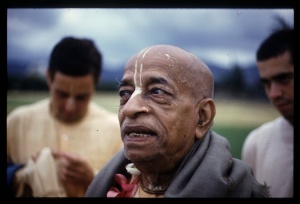CC Madhya 24.212: Difference between revisions
m (1 revision(s)) |
No edit summary |
||
| Line 1: | Line 1: | ||
{{ | [[Category:Sri Caitanya-caritamrta - Madhya-lila Chapter 24|C212]] | ||
<div style="float:left">'''[[Sri Caitanya-caritamrta|Śrī Caitanya-caritāmṛta]] - [[CC Madhya|Madhya-līlā]] - [[CC Madhya 24|Chapter 24: The Sixty-One Explanations of the Atmārāma Verse]]'''</div> | |||
<div style="float:right">[[File:Go-previous.png|link=CC Madhya 24.211|Madhya-līlā 24.211]] '''[[CC Madhya 24.211|Madhya-līlā 24.211]] - [[CC Madhya 24.213|Madhya-līlā 24.213]]''' [[File:Go-next.png|link=CC Madhya 24.213|Madhya-līlā 24.213]]</div> | |||
{{CompareVersions|CC|Madhya 24.212|CC 1975|CC 1996}} | |||
{{RandomImage}} | |||
==== TEXT 212 ==== | ==== TEXT 212 ==== | ||
<div | <div class="verse"> | ||
dehārāmī dehe bhaje | :dehārāmī dehe bhaje 'dehopādhi brahma' | ||
sat-saṅge seha kare kṛṣṇera bhajana | :sat-saṅge seha kare kṛṣṇera bhajana | ||
</div> | </div> | ||
| Line 12: | Line 16: | ||
==== SYNONYMS ==== | ==== SYNONYMS ==== | ||
<div | <div class="synonyms"> | ||
''dehārāmī''—a person who has accepted the body as the self and is interested only in sense gratification; ''dehe''—in the body; ''bhaje''—worships; ''deha-upādhi brahma''—Brahman having the body as a designation; ''sat-saṅge''—in the association of devotees; ''seha''—such a person; ''kare''—does; ''kṛṣṇera bhajana''—service to Lord Kṛṣṇa. | |||
</div> | </div> | ||
| Line 19: | Line 23: | ||
==== TRANSLATION ==== | ==== TRANSLATION ==== | ||
<div | <div class="translation"> | ||
"One in the bodily conception worships his own body as Brahman, but when he comes in contact with a devotee, he gives up this mistaken idea and engages himself in the devotional service of Lord Kṛṣṇa. | |||
</div> | </div> | ||
__NOTOC__ | |||
<div style="float:right; clear:both;">[[File:Go-previous.png|link=CC Madhya 24.211|Madhya-līlā 24.211]] '''[[CC Madhya 24.211|Madhya-līlā 24.211]] - [[CC Madhya 24.213|Madhya-līlā 24.213]]''' [[File:Go-next.png|link=CC Madhya 24.213|Madhya-līlā 24.213]]</div> | |||
__NOTOC__ | |||
__NOEDITSECTION__ | |||
Revision as of 03:03, 15 September 2021
Śrī Caitanya-caritāmṛta - Madhya-līlā - Chapter 24: The Sixty-One Explanations of the Atmārāma Verse

His Divine Grace
A.C. Bhaktivedanta Swami Prabhupada
A.C. Bhaktivedanta Swami Prabhupada
TEXT 212
- dehārāmī dehe bhaje 'dehopādhi brahma'
- sat-saṅge seha kare kṛṣṇera bhajana
SYNONYMS
dehārāmī—a person who has accepted the body as the self and is interested only in sense gratification; dehe—in the body; bhaje—worships; deha-upādhi brahma—Brahman having the body as a designation; sat-saṅge—in the association of devotees; seha—such a person; kare—does; kṛṣṇera bhajana—service to Lord Kṛṣṇa.
TRANSLATION
"One in the bodily conception worships his own body as Brahman, but when he comes in contact with a devotee, he gives up this mistaken idea and engages himself in the devotional service of Lord Kṛṣṇa.